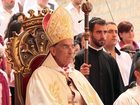A deadly strike blamed on Israel against Iran's diplomatic mission in Damascus could trigger a spillover of the Gaza war across the region, an escalation Tehran had sought to avoid, analysts said.
Monday's strike levelled the consular annex of the Iranian embassy and killed 13 people, including seven members of Iran's Islamic Revolutionary Guard Corps (IRGC), Iranian state media reported.
 Full Story
Full Story
Lebanon's Foreign Ministry condemned Tuesday a strike widely attributed to Israel that demolished Iran's consulate in the Syrian capital of Damascus and killed 13 people, including two Iranian generals.
"The targeting of diplomatic headquarters and missions is a violation of international law and a serious violation of the Vienna Convention which guarantees the immunity of diplomatic headquarters," the Foreign Ministry said in a statement.
 Full Story
Full Story
Israeli army chief Lt. Gen. Herzi Halevi has approved new plans for the northern front during a visit to the army’s Northern Command headquarters in Safed, the Israeli military said.
 Full Story
Full Story
Hezbollah targeted Tuesday groups of soldiers in the Malkia post in northern Israel, while Israel shelled the outskirts of al-Naqoura in south Lebanon.
Earlier on Tuesday, Hezbollah warned that Israel will pay for killing high-level Iranian Revolutionary Guards in a strike on the country's consulate in Damascus, Syria, the day before. Later during the day, the group announced the death of one of its fighters "on the road to Jerusalem."
 Full Story
Full Story
Hezbollah warned Tuesday that Israel will pay for killing high-level Iranian Revolutionary Guards (IRGC) in a strike on the country's consulate in Damascus, Syria, the day before.
The airstrike in Syria killed Gen. Mohammad Reza Zahedi, who led the elite Quds Force in Lebanon and Syria until 2016, according to Iran’s Revolutionary Guard. It also killed Zahedi’s deputy, Gen. Mohammad Hadi Hajriahimi, and five other officers.
 Full Story
Full Story
The Israeli army on Monday said its warplanes attacked around ten Hezbollah targets in the southern town of Rashaya al-Fukhar.
 Full Story
Full Story
An air strike in south Lebanon "eliminated" a Hezbollah missile unit commander, Israel's military said, with Israel and Hezbollah exchanging near-daily cross-border fire for months.
The Israeli Air Force "struck a vehicle in the area of Kounine in Lebanon in which Ismail al-Zein was located," the Israeli military said. "Al-Zein was a significant commander in the Anti-Tank Missile Unit of Hezbollah's Radwan Forces," the Israeli army added.
 Full Story
Full Story
U.N. Secretary-General Antonio Guterres has condemned the explosion that wounded three UNTSO military observers and a Lebanese interpreter in south Lebanon on Saturday, while expressing “grave concern” at the daily exchanges of fire between Hezbollah and the Israeli forces.
 Full Story
Full Story
UNIFIL said three military observers and a translator were wounded Saturday in a blast in southern Lebanon, where Israel and Hezbollah trade frequent cross-border fire.
Peacekeepers from the United Nations Interim Force in Lebanon (UNIFIL) patrol the so-called Blue Line, the border demarcated by the U.N. in 2000 when Israeli troops pulled out of southern Lebanon.
 Full Story
Full Story
Maronite Patriarch Beshara al-Rahi on Saturday stressed that “the south is the heart of Lebanon and is going through the severest and most difficult suffering.”
In his Easter message, al-Rahi saluted “the southerners who are resilient in their towns and villages under the bombardment” and “all those who lost dear ones, whose homes were destroyed or who were displaced to other regions.”
 Full Story
Full Story



